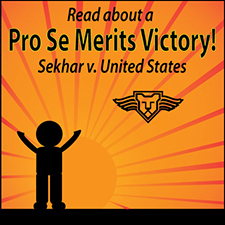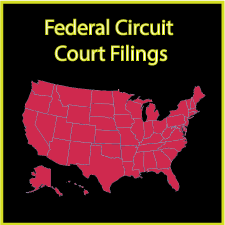Petition of the Month, August 2014:
Wanda Dry v. Christi Lenay Steel et al.
The Supreme Court Press “Petition of the Month”TM for July 2014 is Wanda McClureDry v. Christi Lenay Steele et al. Supreme Court Dkt. No. 14-180, an appeal coming out of the State of Tennessee. The petition was filed pro se by the petitioner Wanda Dry, who is also an attorney and a member of the Supreme Court Bar.
Questions Presented:
1.Does mailing a Suggestion of Death to the former law office of a deceased, pro se plaintiff satisfy due process requirements of notice and opportunity to be heard, prior to the dismissal of a cause of action?
2.Is the equal protection clause of the United States Constitution violated by the lack of procedural due process protections that deceased litigants retain compared to those held by living litigants?
3.Does the surviving spouse of a deceased, pro se plaintiff have standing to raise constitutional issues for decedent’s heirs at a hearing at the trial court level and then appeal the trial court’s dismissal of the decedent’s cause of action?

They say that neither snow, nor rain can stop the US Postal Service from delivery. However, what happens when something is mailed to a deceased person? What if that item is an all-critical legal notice that is meant to be served upon living heirs and representives of the deceased person? The case of McClure Dry v. Steele et al., No. 14-180, asks this very question. It was a tragic scenario. Wanda Dry's husband Dr. Laurence Dry had just passed away, leaving his legal suit against defendants Steele et al. in limbo. According to the petition, the defendants served a "Suggestion of Death" by mailing it to the deceased, instead of herself as widow or the adult children who were Dr. Dry's heirs. The filing of a Suggestion of Death is a prelude to a motion to dismiss, if the heirs do not file for substitution. It is a document of such importance that both the Tennessee and Federal Rules of Civil Procedure require personal service upon non-parties to the matter. According to the petition, the Defendants mailed a Suggestion of Death to the deceased Dr. Dry's business address, and even then it is alleged they mailed it to wrong address. By the time Mrs. Dry was notified of the motion to dismiss, the train was already barreling down the tracks. The widow Mrs. Dry, herself an attorney and member of Supreme Court bar, protested, asking for more time to properly notify heirs and obtain counsel. The lower court held that the 90 clock to the dismissal began with the alleged mailing (which was not received by the widow) of the Suggestion of Death to the decedent's office and that personal service was not required. |

| Ms. Dry, thank you for discussing your case with us. It deals with a difficult time in your life, after your husband, Dr. Laurence Dry, passed away. At that time, he was a pro se (i.e., not represented by an attorney) plaintiff in a lawsuit against members of a medical group and their attorneys. What happened to his case after this tragedy? | |
 |
Less than a week after my husband died - before we had even had his funeral, one of the defense attorneys mailed a document called a “Suggestion of Death” to the court to let them know my husband had died. He also claims to have mailed a copy to my husband’s law firm, but has not produced any proof of that. I had a conversation with that attorney and we agreed to put all litigation on hold for a while so I could try to get things in my life sorted out. I did not realize the defense attorneys would surprise me that fall with a “Motion to Dismiss for Failure to Substitute.” They told the court that they had filed the Suggestion of Death with the court and waited the required 90 days, and since neither I nor any of Dr. Dry’s children had responded by requesting someone be substituted as a party for my husband, Tennessee law required his case to be dismissed. They also told the court that they had served my husband, as a party, under Rule 25.01 of the Tennessee Rules of Civil Procedure by mailing it to him, because “at least technically, whether Larry could read it or not, he was served through the office.” The court dismissed my husband’s case in December 2012. I have been appealing ever since. |
Can you describe what the “Suggestion of Death” document is and what its purpose is? |
|
A Suggestion of Death is a document that can be filed with the court to let it know when a party to a lawsuit has died. Under Rule 25 of the Tennessee Rules of Civil Procedure, the case shall be dismissed if a Motion to Substitute a new party for the deceased party is not filed within 90 days after the Suggestion of Death is properly filed with the court and served upon the proper non-parties, such as heirs, successors, or representatives of the deceased party. (The court can grant an enlargement of time in which to file the Motion to Substitute.) One of the disputes in this case is whether or not, prior to the dismissal of the case, any non-parties, such as Dr. Dry’s heirs, had to have been served with the Suggestion of Death, and if so, which ones, and by what method. Special, “personal service” of the Suggestion of Death is required for any non-party to whom it should be sent. That personal service is used to make sure the person receiving it is aware that they are receiving an important, legal document that requires some action. |
|
So in other words-a Suggestion of Death is a Red Flag that they are trying to dismiss a case. It is a call to action. Did you receive the service of the Suggestion of Death in May 2012? |
|
That’s right – it is a call to action. That’s why non-parties should get personal service – like that required for a summons. I do not recall ever seeing the Suggestion of Death prior to November 2012. A copy of it was mailed to my Kentucky law office as an attachment to the defense attorney’s Motion to Dismiss for Failure to Substitute. The attorney certified that he served “counsel for all parties” by delivering a copy to counsel’s office, but, he did not state the address that he mailed it to. Also, since my husband filed his case pro se, he did not have counsel to be served. The defense is arguing now, that I was counsel for some parties in a related lawsuit and that that should mean that I was served when it was mailed, even though no one knows whether a copy was mailed to my husband’s correct office address or not. |
|
Doesn’t it seem a bit archaic in the modern world, that a party can claim to have served you such an important document by putting a stamp on an envelope and then swearing they mailed you something? |
|
The “mailbox rule” says, “Service is deemed complete at the instant the documents are placed into the hands of the United States Post Office or a Post Office Box. . . Nonreceipt or nonacceptance of the envelope containing the papers is insignificant and has no effect on the validity of service.” (Russell v. City of Milwaukee, at 667) (citations omitted) It actually works pretty well most of the time because it usually applies to documents mailed from one party’s attorney to another. Many times the attorneys are already expecting those items, and will ask for a copy if they don’t receive one. Also, the court can extend the time for a response if it finds out that an attorney did not receive the document another attorney said was mailed. So, usually, it should not be a huge deal. The problem is, in my husband’s case, the court refused to extend the time for his heirs to respond, and dismissed his case. That started the appellate process that is now at the United States Supreme Court Petition for Writ of Certiorari stage. |

By the letter of the law, when a party passes away, doesn’t service have to be personal? |
|
Under Rule 25 of the Tennessee Rules of Civil Procedure, parties may be served with the Suggestion of Death by mail under Rule 5, but non-parties (e.g., heirs) must be served by personal service under Rule 4. The Tennessee Court of Appeals held that, even though I was not a party to my husband’s lawsuit, mailing the Suggestion of Death to my husband’s office, constituted proper service on me. |
|
So they claimed they didn’t have to serve you personally, because you were a party in a related action. However, how did they treat you at the hearing you attended telephonically? |
|
 |
The court had a hearing in December 2012 and I attended by phone from my office in Kentucky. I suggested to the court that the hearing be postponed until the heirs could be notified, but the court refused. I asked the court to put the names of the heirs in the record so they could be notified that the case had been dismissed, and the court refused. The judge told me repeatedly during the hearing that I was not a party and finally ended my phone call, saying, “Wanda, I know. Listen, I’m going to end this. You’re not even a party and I appreciate everything, and I appreciate you wanting to assert other things and put on the record. What I’m going to do is I’m going to go ahead and end the hearing.” He continued the hearing after that with just the defense attorneys. |
 The Petition provides a thorough detailing of the fierce conflict between various states and federal courts on this issue. The Third, Fifth, and Tenth Federal Circuits require identification of and personal service upon non-parties, while the Second Circuit does not. Colorado, along with a majority of states and circuits, sees the precedent as “unequivocal” in requiring personal service of interested non-parties. - Wanda McClure Dry
The Petition provides a thorough detailing of the fierce conflict between various states and federal courts on this issue. The Third, Fifth, and Tenth Federal Circuits require identification of and personal service upon non-parties, while the Second Circuit does not. Colorado, along with a majority of states and circuits, sees the precedent as “unequivocal” in requiring personal service of interested non-parties. - Wanda McClure DrySounds like they were just giving you a pat on the head, before whisking you away. |
|
 |
It felt like that too. |
The Tennessee courts were not consistent in their treatment of you, right? Didn’t your husband previously have a medical malpractice case dismissed due to what was claimed to be improper service? |
|
That’s right. My husband’s case is the fifth case in a related set of cases that started when the physician in the first case was dismissed for insufficient service of process under Rule 4. My husband and I had filed a medical malpractice case against Dr. O’Connor, in Oak Ridge, Tennessee. Apparently the deputy gave the Complaint and Summons to the office manager who gave the documents to Dr. O’Connor’s partner, who gave them to him. So, he was personally served – just not by the deputy. Dr. O’Connor filed a timely answer to the Complaint, gave and took depositions, and fully participated in the lawsuit against him for approximately one year, until the date for the statute of limitations had passed. Then, he convinced the court that he had not been properly served under Rule 4 and the court dismissed him from the case. We filed an application for an interlocutory appeal of that decision, but the Tennessee Court of Appeals denied it, stating, “we do not find that an interlocutory appeal is necessary to prevent irreparable harm or to prevent needless, expensive and protracted litigation.” |
|
I’d like to turn now to your petition. We were really impressed by the body of research you compiled. How did you find this same issue was being handled elsewhere in the country? |
|
The Petition provides a thorough detailing of the fierce conflict between various states and federal courts on this issue. The Third, Fifth, and Tenth Federal Circuits require identification of and personal service upon non-parties, while the Second Circuit does not. Colorado, along with a majority of states and circuits, sees the precedent as “unequivocal” in requiring personal service of interested non-parties. Grandbouche v. Lovell, 913 F.2d 835 (10th Circ. Colo. 1990), while Mississippi believes “[t]he federal courts are divided.” Clark v. Knesal, 113 So.3d 531 (Miss.2013) and Minnesota states “It is not well-established, however, who may be considered Decedent’s ‘successor’ under Rule 25(a)(1).” Torres v. Bayer Corp, 616 F.3d 778, 783 (8th Cir. Minn. 2010). The result is diametrically opposing interpretations of Rule 25 depending on state and circuit. This is no small matter. “One study of federal litigation found that pro se litigants appeared in thirty-seven percent of all cases...”, Drew Swank, The Pro Se Phenomenon, 19 BYU L Pub. L. 373, 377 (2005). Some eighty to ninety percent or more of family law cases involve one pro se litigant. Russell Engler, And Justice for All, 67 Fordham L. Rev 1987, 2022, n.4 (1999). It is a fact of life (and death) that in this vast population of litigants, some of them will die every year, distributed all over the country. Those heirs and successors in some states will receive personal service and have the opportunity to substitute and be heard, while those in states like Tennessee will be deprived of their due process rights under the Fourteenth Amendment. |
|
Your research was on point. Resolving conflict is at the heart of what the Supreme Court does. Describe how you went about conducting the research. Were you surprised at the journey, and the discoveries you made, and the challenge to get started with the writing when the research is so interesting. |
|
Basically, I conducted my research the way I always do – I just jumped into it. I was surprised to find so much conflict among the courts throughout the United States, because, in many respects it seems like Rule 25 is a pretty straightforward rule. But, the way it is written requires everyone to read between the lines, and make a few assumptions, and that seems to be where the trouble starts. Everyone who is applying the rule seems to have his/her own way of interpreting it, and the assumptions seem to get out of control, so the result is massive conflict about what the real meaning is, or should be. |

We’d like to ask you about your experience working with the Supreme Court Press, and Specifically the Editor process. Did you find the editor was able to take your initial draft to the next level with useful feedback? How did you use the Editor and how would you rate the evolution of your brief. |
|
I am very pleased with my experience working with the Supreme Court Press. While the whole process of filing a Petition for Writ of Certiorari with the United States Supreme Court was daunting, they greatly reduced my stress level. They encouraged me from day one and helped me focus so that I could turn my initial idea into a finished product that I believe effectively expresses some serious, nationwide concerns about the due process rights of deceased litigants and/or their heirs. This is my first Petition to the United States Supreme Court, so I have not used other service providers like the Supreme Court Press. However, if I do need to use someone again in the future, I will not hesitate to use them again. Geary worked closely with me throughout this project, and was full of helpful advice and encouragement. |
|
Disclaimers: The Supreme Court Press does not provide legal advice. The Supreme Court Press does not endorse either party in this matter and expresses no legal opinion on any case selected as Petition of the MonthTM . The Supreme Court Press reports what Petitioners have stated, and cannot validate the statements or allegations of the Petitioner. |
 This is my first Petition to the United States Supreme Court, so I have not used other service providers like the Supreme Court Press. However, if I do need to use someone again in the future, I will not hesitate to use them again. - Wanda McClure Dry
This is my first Petition to the United States Supreme Court, so I have not used other service providers like the Supreme Court Press. However, if I do need to use someone again in the future, I will not hesitate to use them again. - Wanda McClure Dry

---Bryan-Krumm.png)
---ZoeSpencer.png)


